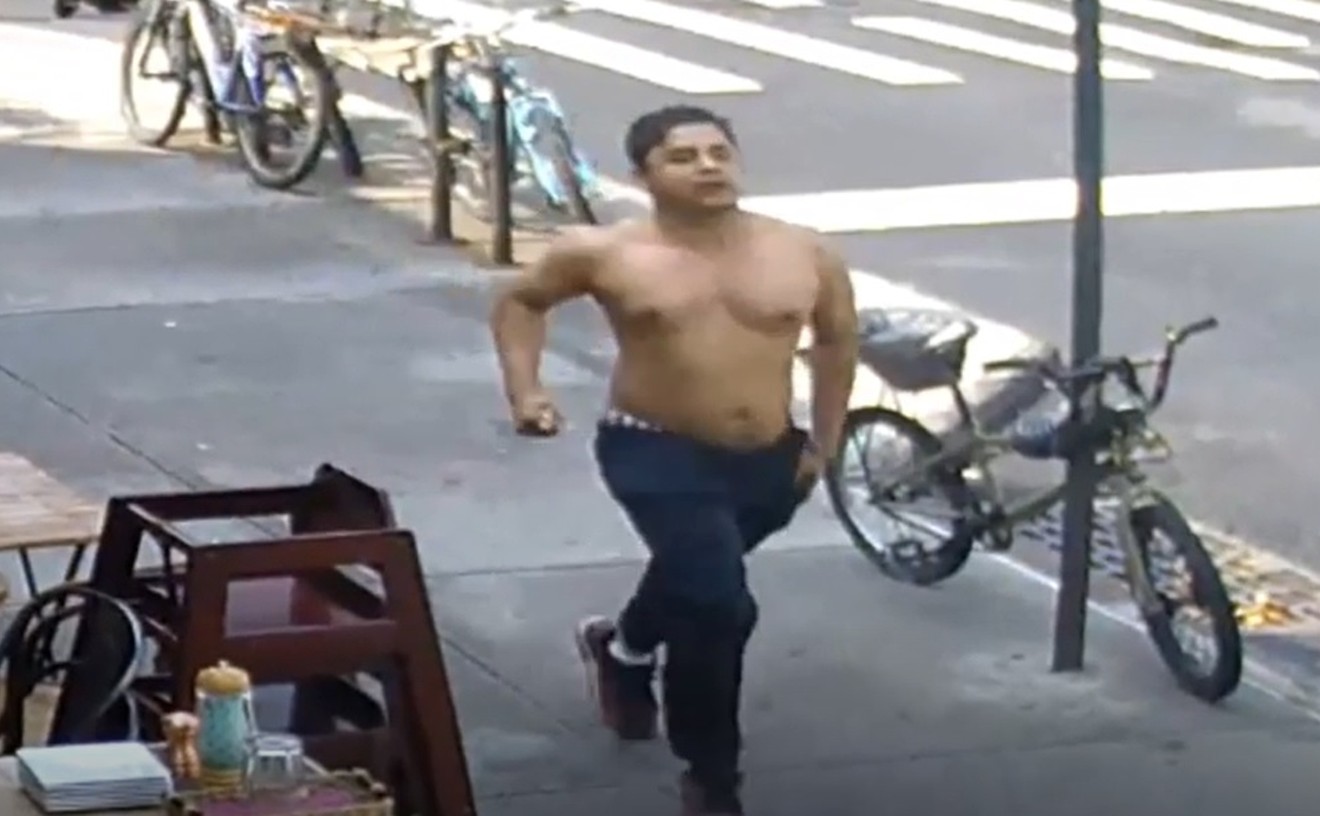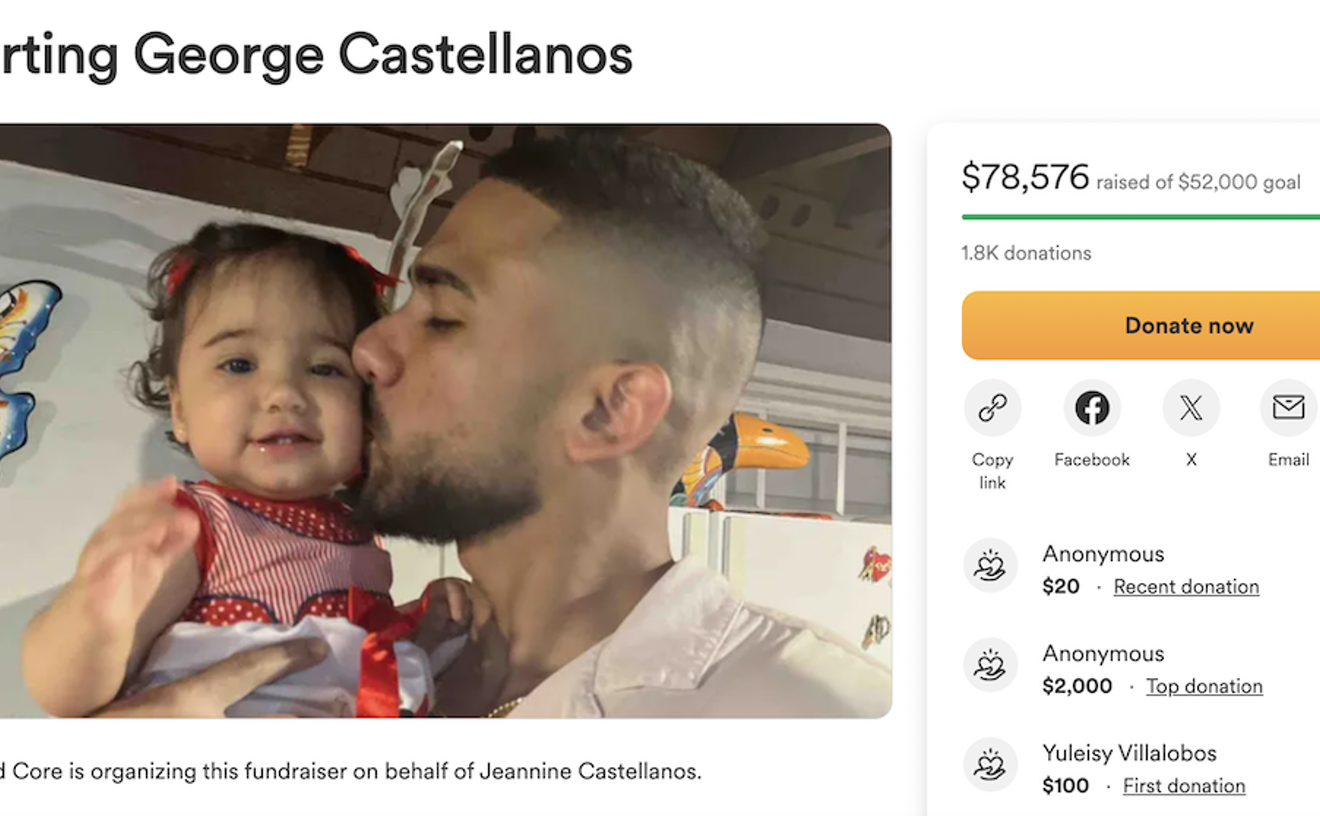The occasion was a bond hearing for Lee, held in the courtroom of Judge Andrew Hague. But when the widow took the stand and Robert Barrar, co-counsel for Lee along with Rubin, began asking her questions, it seemed as though the trial had already begun and that she was the accused. Barrar's objective was to cast so much doubt on the charges against his client that the judge would allow Lee to bond out of jail. The attorney's strategy was to level a long series of accusatory questions at Denise Calvo suggesting she had killed her husband José during the driveway incident.
Suspicions about 40-year-old Denise's possible involvement in the crime arose shortly after the murder, when detectives learned that she was friends with Anthony Lee's mother Verneka and had bought crack cocaine from her and Anthony. After twice meeting with Miami homicide detectives to answer their questions, Denise stopped cooperating.
Citing her constitutional protection against self-incrimination, she repeatedly responded to questions at last week's hearing by reading the following statement: "Based upon Fifth Amendment principles, although I am innocent of any wrongdoing, I respectfully decline to answer the question on the advice of counsel." Despite the fact that she didn't answer 42 of 46 questions Barrar posed to her, Judge Hague refused to release Lee on bond, deeming him a flight risk and a potential danger to Calvo. In doing so, Hague noted that Lee had fled to South Carolina after the murder. The judge also cited remarks made by one of Lee's acquaintances, 49-year-old James Mullins. In a lengthy statement to police, Mullins reported that Lee had called him shortly after the shooting and said Denise wouldn't have "the last laugh" and "that bitch gonna get hers. Crack smoking-ass bitch." Mullins told detectives he believed Denise and Anthony were in "cahoots" on the day of the murder and that "she tried to cross him."
Barrar's questioning provided a glimpse into the defense he and Rubin are building with documents the Miami-Dade State Attorney's Office began releasing to them (and news media) in January, as part of a standard procedure in criminal prosecutions known as "discovery." Among the materials were transcripts of lengthy interviews police have conducted with people connected to the case.
Some of the questions Calvo refused to answer refer to information that has already been publicized: Do you know Anthony Lee? Did you ever use crack cocaine? Did you ever purchase crack cocaine? Did you shoot your husband? Did you participate in the shooting of your husband? Did your husband have a life insurance policy of which you were the beneficiary of $1.5 million? Did you recently sell your house for $850,000? How many guns do you own? (Detectives recovered five handguns in the Calvo residence after the murder. According to state records, neither Denise nor José Calvo had a concealed-weapon permit at the time of the shooting.)
Below are more of Barrar's unanswered questions, each pointing to information detectives gathered from friends of Lee and his mother. Taken together, they help explain why police believe Denise Calvo is a suspect in her husband's murder. Police interviews also indicate that Denise and José were deeply entangled with cocaine dealers and prostitutes in the black Grove, and that their marriage may have been strained by jealousy, rage, and drug addiction. Barrar's questions to Denise appear in italics.
Do you know Marquese Williams?
Miami police detectives Ervens Ford and Manuel Castillo questioned 29-year-old Marquese Williams at 4:00 a.m. on September 23, five days after the shooting. Williams, a friend of Anthony Lee, told police he had met Denise two or three years before the murder, while he was living at Verneka Lee's residence. At the time Williams worked as a waiter at Paolo Luigi's restaurant near CocoWalk. He said he had "no idea at all" who killed José Calvo or why. He did admit to using cocaine at the Lee residence, but never with Denise. He also affirmed he had been to the Calvo residence twice, to pick up some used clothes and "a bunch of old stuff," including telephones.
Were you having an affair with Marquese Williams?
Initially Williams told Ford and Castillo he'd never had a "romantic" relationship with Denise. "Just nice friends," he told them. But a few minutes later he conceded he could have said yes to the question.
"You dealing drugs to women like that, you know, you do your best to get pussy. Something, you know," Williams confessed.
"I think I understand," Ford replied.
"Yeah, you understand where I'm coming from," Williams added.
Williams told the detectives the last time he had seen Denise was in the parking lot of the Walgreens at NW 37th Avenue and South Dixie Highway, about a month before the murder. "She say, 'Hello.' She gave me a kiss on the cheek and asked where I been, and things like that. And asked me how she can get in touch with me. I told her she can just swing by Walgreens. And then she was on her way."
Do you know Teresa Cosentino?
Detectives Ford and Castillo began questioning 40-year-old Teresa Torres Cosentino just before midnight on September 27. Cosentino, who resides in the Coral Lake area just west of Coral Gables, told the cops she had twice previously lived at the Lee residence and considers Verneka a "best friend." She said she'd taken care of Anthony Lee's children at times over the years. According to Cosentino, Denise visited Verneka "every day" and had often given clothes to kids in the black Grove. Verneka was going through a "very, very, very rough" time after Anthony's release from prison in May 2003 because he had taken over most of the household's crack-dealing business and wasn't sharing the proceeds with his mother, Cosentino explained. Marquese Williams and his friend Jimmy Kimbrough had handled deliveries for Verneka but were now working for Anthony, she added, and many of those "drop-offs" were made to the Calvo residence. As a result of Verneka's cash-flow problems, Denise began paying her rent and other bills. "That's how close they been for the last six months," Cosentino noted.
Cosentino told police she'd met Denise seven or eight years ago and the two had spoken "every day." After the murder, Denise asked her not to tell police about their friendship, a request that angered Cosentino. Still she described Denise as a "very nice person" and said the two often visited each other and smoked together.
"What is it that you guys smoke together?" Detective Ford asked.
"Crack cocaine," Cosentino replied.
Cosentino told the cops Denise "never had trouble paying for the crack" but that she didn't know if Denise owed Verneka or Anthony money for drugs. She said Williams and Kimbrough made cocaine deliveries to the Calvo residence "on a daily basis," adding: "The orders were big."
Denise Calvo earlier had told police she bought only powder cocaine from the Lees, not crack. She claimed to have smoked crack only once.
Were you angry at your husband for having an affair with a woman named Bonny? Were you angry about the fact that your husband had a habit of going into Coconut Grove and seeking prostitutes? Did you and your husband engage in sex acts with threesomes?
Cosentino said she never saw Denise and Anthony Lee together, but she did have some startling information about José Calvo.
"He get prostitutes off the street," she asserted.
"How often?" Ford asked.
"Very often, from what I understand," said Cosentino.
Cosentino added that she once saw José Calvo, Marquese Williams, and a girl "hanging around behind Walgreens."
"What was it that Mr. Calvo was doing with the prostitute?" the detective wondered.
"Blow jobs," she replied.
Cosentino said she learned that Calvo had also engaged in "three-ways" with Denise. "That was [with] the higher-class prostitute.... My girlfriend was one of the first ones to go with him. She'd been offered a thousand dollars to go and have sex with him. And she wasn't even a prostitute. But she took the money.... Marquese was the guy that got most of the girls for him ... over at the Walgreens parking lot." Cosentino had also heard that "Marquese and [Denise were] apparently fooling around. It's gross to me that she's been that way. She's promiscuous."
In his statement to police, Marquese Williams said he had met José Calvo about a year earlier when the former auto dealer showed up at the Walgreens parking lot looking for somebody.
"You remember who he was looking for?" Ford asked.
"Yeah, it was this girl. He was looking for this girl," answered Williams.
"Was José and this girl involved?" Ford continued.
"I am not sure. But he was looking for her," Williams said.
"Who was the girl?" the detective pressed.
"Girl named Bonny," Williams replied.
"You know what Bonny does for a living?" said Ford.
"Prostituting, yeah," affirmed Williams.
In her September 27 statement to police, Verneka Lee said Bonny had "bragged" about how nice José Calvo treated her. "How he buy her what she want, give her money, and take care of her, you know?"
Cosentino had another hint for the detectives that Barrar and Rubin will be certain to seize upon when Lee's trial begins, possibly this fall. After the murder, Verneka had told her about a plan Anthony and Denise had worked out involving the theft of a diamond ring, apparently belonging to José Calvo. Verneka told her: "The deal was going wrong and she tried to shoot him instead," Cosentino recounted. Cosentino also thought it was significant to mention that Denise and her husband argued a lot. "They're always pissed off at each other," she told detectives.
Is it true that your husband threatened to kill someone who you claim robbed you?
Marquese Williams told police that in May 2003 Denise was mugged while in her car on a nighttime visit to the black Grove to buy crack. "Some guys came up to the car and pulled her out and tried to rob her," Williams said. "And she jumped back into the car and she ran over one of the guy's bicycle."
Verneka Lee provided the detectives with more details about that incident. Previously, she said, Williams had interacted with Denise and José separately and had not known they were married until an enraged José arrived shortly after the mugging. "I seen her husband walking up," Verneka recounted. "Me and Marquese [Williams] were out there together. [José] was very upset because he said, 'Somebody just robbed my wife and beat her up.' He was coming to retaliate. And that's when Marquese realized that Denise and José were husband and wife."
Denise herself learned something new that night, according to Verneka. "I told her that her husband and Marquese had been going around looking for hookers for her husband," Verneka noted. "She was like in disbelief." Verneka also told police that Williams was Denise's preferred cocaine courier and that she suspected the two were having sex regularly.
When Barrar finished his litany of questions, Denise Calvo left the courtroom, accompanied by her lawyer Michael Rosen. They were joined by her father Michael Angelo Caligiuri, whom federal authorities once labeled an "armed and dangerous" member of the Gambino organized crime family. (He was released from prison in 2002 after serving about five years for racketeering and possession of cocaine with intent to distribute.) Mr. Caligiuri wandered off, leaving Calvo and Rosen to march down the hallway toward a horde of television reporters and cameras. Neither she nor her lawyer had anything to say.
Earlier in the bond hearing, Barrar had questioned Det. Ervens Ford, and in the process revealed another important line of inquiry they will likely pursue at trial.
You do not know what gun was used to kill the deceased?
Ford replied: "The answer to that is: correct."
That bullet could have come from Denise Calvo's gun?
"Objection!" shouted prosecutor Gail Levine, arguing that the question called for speculation.
"Sustained," replied the judge.










